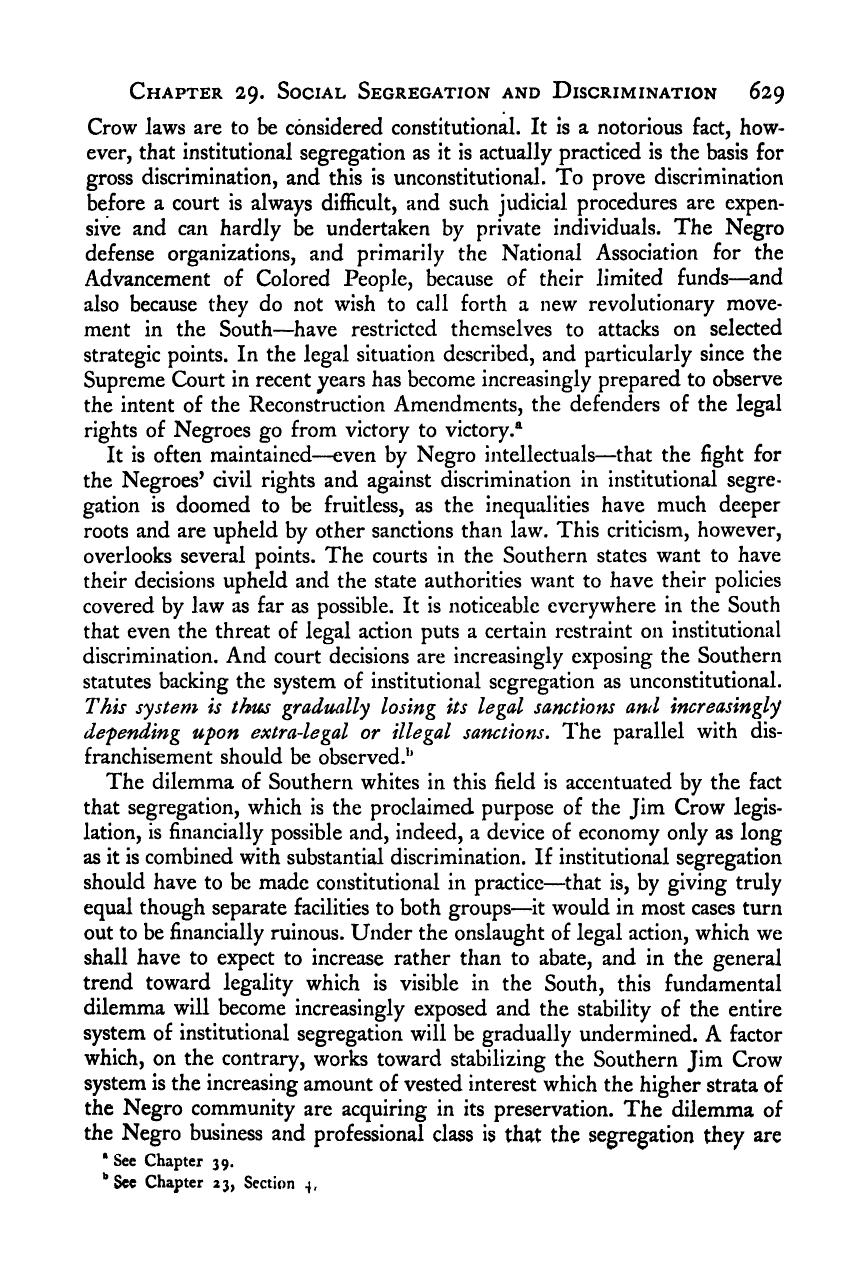Note: Gunnar Myrdal died in 1987, less than 70 years ago. Therefore, this work is protected by copyright, restricting your legal rights to reproduce it. However, you are welcome to view it on screen, as you do now. Read more about copyright.
Full resolution (TIFF) - On this page / på denna sida - VII. Social Inequality - 29. Patterns of Social Segregation and Discrimination - 5. The General Character of Institutional Segregation

<< prev. page << föreg. sida << >> nästa sida >> next page >>
Below is the raw OCR text
from the above scanned image.
Do you see an error? Proofread the page now!
Här nedan syns maskintolkade texten från faksimilbilden ovan.
Ser du något fel? Korrekturläs sidan nu!
This page has never been proofread. / Denna sida har aldrig korrekturlästs.
Chapter 29. Social Segregation and Discrimination 629
Crow laws are to be considered constitutional. It is a notorious fact, how-
ever, that institutional segregation as it is actually practiced is the basis for
gross discrimination, and this is unconstitutional. To prove discrimination
before a court is always difficult, and such judicial procedures are expen-
sive and can hardly be undertaken by private individuals. The Negro
defense organizations, and primarily the National Association for the
Advancement of Colored People, because of their limited funds—and
also because they do not wish to call forth a new revolutionary move-
ment in the South—have restricted themselves to attacks on selected
strategic points. In the legal situation described, and particularly since the
Supreme Court in recent years has become increasingly prepared to observe
the intent of the Reconstruction Amendments, the defenders of the legal
rights of Negroes go from victory to victory.*^
It is often maintained—even by Negro intellectuals—that the fight for
the Negroes’ civil rights and against discrimination in institutional segre-
gation is doomed to be fruitless, as the inequalities have much deeper
roots and are upheld by other sanctions than law. This criticism, however,
overlooks several points. The courts in the Southern states want to have
their decisions upheld and the state authorities want to have their policies
covered by law as far as possible. It is noticeable everywhere in the South
that even the threat of legal action puts a certain restraint on institutional
discrimination. And court decisions are increasingly exposing the Southern
statutes backing the system of institutional segregation as unconstitutional.
This system is thus gradually losing its legal sanctions and increasingly
defending upon extra-legal or illegal sanctions. The parallel with dis-
franchisement should be observed.**
The dilemma of Southern whites in this field is accentuated by the fact
that segregation, which is the proclaimed purpose of the Jim Crow legis-
lation, is financially possible and, indeed, a device of economy only as long
as it is combined with substantial discrimination. If institutional segregation
should have to be made constitutional in practice—that is, by giving truly
equal though separate facilities to both groups—it would in most cases turn
out to be financially ruinous. Under the onslaught of legal action, which we
shall have to expect to increase rather than to abate, and in the general
trend toward legality which is visible in the South, this fundamental
dilemma will become increasingly exposed and the stability of the entire
system of institutional segregation will be gradually undermined. A factor
which, on the contrary, works toward stabilizing the Southern Jim Crow
system is the increasing amount of vested interest which the higher strata of
the Negro community are acquiring in its preservation. The dilemma of
the Negro business and professional class is that the segregation they are
* See Chapter 39.
**
See Chapter 23, Section
<< prev. page << föreg. sida << >> nästa sida >> next page >>